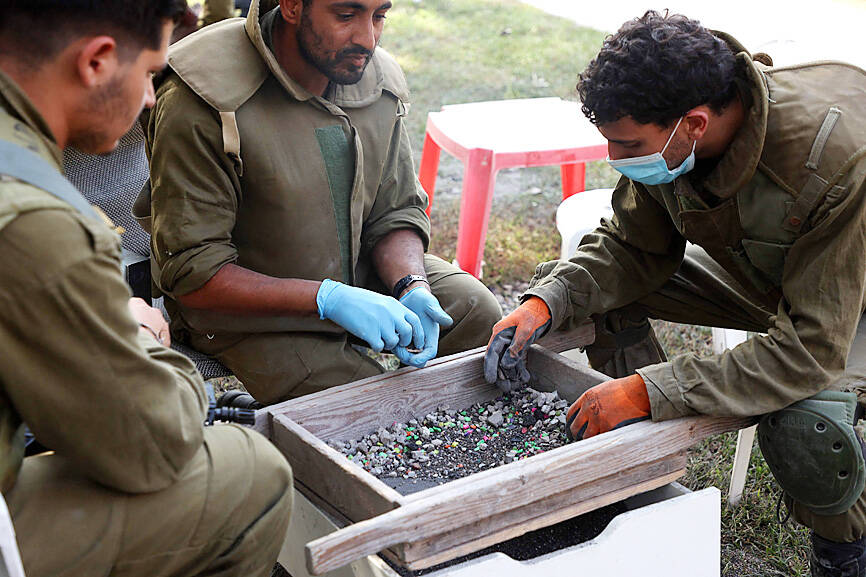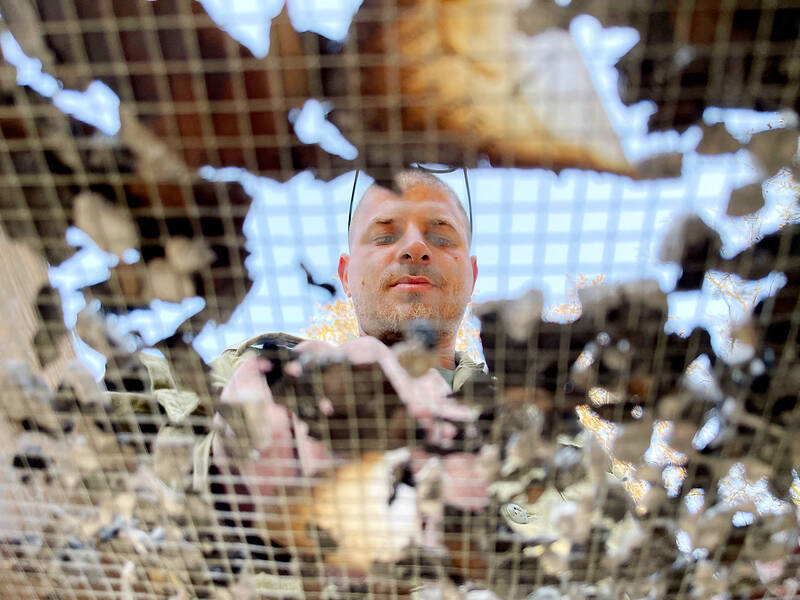Moshe Ajami is no stranger to human remains, but until last month, the bits of bone and teeth he handled were centuries, if not millennia, old.
Now, he and a team of archeologists from the Israel Antiquities Authority (IAA) have turned their skills to finding and identifying the victims of Hamas’ bloody Oct. 7 attack.
Despite using the same techniques, this is grim work compared with their usual digs.

Photo: AFP
“We needed to go into the burned houses and start doing the archaeological work, which ordinarily is in a pastoral [setting], outdoors, we excavate antiquities, everyone smiling,” said Ajami, a career archeologist and deputy director of the IAA.
In the weeks following the attack, paramedics, police and Zaka, an Israeli organization specializing in collecting human remains, combed over the devastation in southern Israel’s towns, cities and kibbutzim.
However, the scope and scale of Hamas’ attack — in which Israeli officials said about 1,200 people, mostly civilians, were killed — has presented a challenge in identifying the bodies of the dead, many of whom were set alight, and locating those still missing.

Photo: Reuters
“Someone in the army thought it was a good idea to invite the IAA, whose expertise is in finding partial human remains — skeletons, including those that are burned,” Ajami said.
Archeologists were first called to Kfar Aza, a kibbutz bordering the Gaza Strip that was attacked by Hamas.
Sifting through soil and ash, they apply decades of experience in “how to identify the smallest fragment of bone in an archeological excavation” to locate the remains of people killed in the Hamas attacks, Ajami said.
More than a month on, approximately 20 people are still listed as missing — neither confirmed dead, nor among the approximately 240 hostages taken by Hamas in Gaza, Israeli officials said.
Forensic archeology rarely deals “with an ongoing, contemporary disaster,” Ajami said. “It’s a different mission to try and find skeletons of missing persons in that hell, while 24/7 there are explosions and shelling all around us, and you need to do the mission. But we didn’t stop for a moment.”
On Thursday, archeologists and forensics teams scoured burnt-out homes in Nir Oz, a kibbutz in southern Israel where a quarter of its 400 residents were killed, wounded, or taken hostage to Gaza. The grim work’s methodology bears passing similarity to an archeological dig.
“We divide the house into several locations and start digging,” said Ari Levy, an IAA archeologist working at Nir Oz.
Incinerated cars and the rooms of torched homes are broken down into grids, with the debris sifted for bone fragments and teeth. Any find sites are then meticulously documented.
“All these actions increase our possibility of identifying the remains and the findings we are looking for,” Levy said.
Families are asked about metal implants and prosthetics or jewelery that might help identify remains. The emotional toll is heavy.
“We know who we’re looking for, we know their faces in many cases, the names, the families, and the feeling here is ... difficult, because we can’t detach emotionally,” Levy said.
Ajami said teeth are especially important “because you can extract DNA from them even when the skeleton is burned.”
Of the roughly 60 people whose remains he and his team have found, at least 10 have been identified and laid to rest, Ajami said.
“I never believed I would have to do something like this, and I don’t think anyone in the world thought that something like this would happen,” Ajami said, adding that after 30 years of field archeology “all of that knowledge that I’ve accumulated is all funneled into this mission.”
“If we hadn’t come and lent a hand there, they never would have found these people. It’s a big privilege for me,” he said.

Kehinde Sanni spends his days smoothing out dents and repainting scratched bumpers in a modest autobody shop in Lagos. He has never left Nigeria, yet he speaks glowingly of Burkina Faso military leader Ibrahim Traore. “Nigeria needs someone like Ibrahim Traore of Burkina Faso. He is doing well for his country,” Sanni said. His admiration is shaped by a steady stream of viral videos, memes and social media posts — many misleading or outright false — portraying Traore as a fearless reformer who defied Western powers and reclaimed his country’s dignity. The Burkinabe strongman swept into power following a coup in September 2022

‘FRAGMENTING’: British politics have for a long time been dominated by the Labor Party and the Tories, but polls suggest that Reform now poses a significant challenge Hard-right upstarts Reform UK snatched a parliamentary seat from British Prime Minister Keir Starmer’s Labor Party yesterday in local elections that dealt a blow to the UK’s two establishment parties. Reform, led by anti-immigrant firebrand Nigel Farage, won the by-election in Runcorn and Helsby in northwest England by just six votes, as it picked up gains in other localities, including one mayoralty. The group’s strong showing continues momentum it built up at last year’s general election and appears to confirm a trend that the UK is entering an era of multi-party politics. “For the movement, for the party it’s a very, very big

ENTERTAINMENT: Rio officials have a history of organizing massive concerts on Copacabana Beach, with Madonna’s show drawing about 1.6 million fans last year Lady Gaga on Saturday night gave a free concert in front of 2 million fans who poured onto Copacabana Beach in Rio de Janeiro for the biggest show of her career. “Tonight, we’re making history... Thank you for making history with me,” Lady Gaga told a screaming crowd. The Mother Monster, as she is known, started the show at about 10:10pm local time with her 2011 song Bloody Mary. Cries of joy rose from the tightly packed fans who sang and danced shoulder-to-shoulder on the vast stretch of sand. Concert organizers said 2.1 million people attended the show. Lady Gaga

SUPPORT: The Australian prime minister promised to back Kyiv against Russia’s invasion, saying: ‘That’s my government’s position. It was yesterday. It still is’ Left-leaning Australian Prime Minister Anthony Albanese yesterday basked in his landslide election win, promising a “disciplined, orderly” government to confront cost-of-living pain and tariff turmoil. People clapped as the 62-year-old and his fiancee, Jodie Haydon, who visited his old inner Sydney haunt, Cafe Italia, surrounded by a crowd of jostling photographers and journalists. Albanese’s Labor Party is on course to win at least 83 seats in the 150-member parliament, partial results showed. Opposition leader Peter Dutton’s conservative Liberal-National coalition had just 38 seats, and other parties 12. Another 17 seats were still in doubt. “We will be a disciplined, orderly